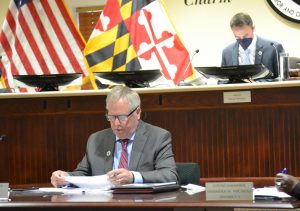
BERLIN – The Berlin Town Council on Monday agreed to give town employees a 1.5% salary increase and restore cell phone and vehicle allowances despite Mayor Zack Tyndall’s objections.
When presented with Tyndall’s budget Monday, the council voted unanimously to amend the mayor’s proposed budget to include a 1.5% cost-of-living-adjustment and restore phone and vehicle allowances that hadn’t been included. Tyndall urged the council to seriously consider the town’s financial position before the vote.
“You have to ask yourself what’s financially responsible…,” he said. “If this does pass and the amendments are made to the budget, I will have no choice but to veto it.”
After months of budget deliberations, the council on Monday hosted a public hearing on the town’s proposed $6.8 million spending plan for fiscal year 2022. The only resident to weigh in on the budget was Carol Rose, who asked the council to consider reinstating staff-related items removed by Tyndall, which included a cost-of-living-adjustment as well as some cell phone and vehicle allowances.
“I think that’s very important those items remain,” she said.
Councilman Jay Knerr made a motion to approve the budget but with numerous amendments. Those amendments restored cell phone allowances to the current level, restored vehicle allowances to the three employees that have had them for years and incorporated them into their salaries, and included a 1.5% salary increase. The changes were made possible by the removal of several expenditures, including feasibility study funding, strategic planning funding and funding allocated for the purchase of a GIS device for the utility funds. The changes also decreased the amount in the town’s general fund contingency from a proposed $125,000 to $49,681.
“Based off my math that’s three days of operating expenditures,” Tyndall said, adding that while $125,000 wasn’t much more it was more.
He also questioned the elimination of funding for computers for his office.
“This is going to severely prohibit the ability of the mayor to do their job,” Tyndall said.
Knerr said the mayor’s assistant had indicated she didn’t want a laptop and that he’d been advised the mayor could log in remotely from home.
“That is incorrect,” Tyndall said.
Tyndall also expressed concern about the 1.5% raise for employees.
“When several of us took office, there was $16,000 in our fund balance, not a strong economic position for the Town of Berlin to be in,” he said. “In an effort to work toward restoring that and making sure that we do not put any of our employees’ jobs at risk during economic uncertainty, I suggest that we do not do the raises in FY 22.”
Knerr said it was only a 1.5% increase.
“They haven’t had a raise in two years,” Knerr replied. “It’s more than necessary, especially in these times when jobs are readily available. We want to do everything we can to retain our employees.”
Tyndall said he didn’t want to see the town have to cut jobs or furlough workers. When he brought up the GIS tool, which he said was critical, Knerr said he didn’t think it was needed this year.
“This is a $30,000 expenditure that it’s my understanding the department heads never requested,” he said. “We just don’t need to spend that money this year.”
The council voted 5-0 to approve the budget with Knerr’s amendments. Following Tyndall’s declaration that he’d veto the budget, Councilman Dean Burrell asked David Gaskill, the town’s attorney, to explain the mayor’s veto power. According to Gaskill, the mayor has six days, not including Sundays, to either sign or veto a bill.
“If he does nothing in that period of time, it would pass,” Gaskill said.
He added that if the mayor vetoed a bill, the council could override the veto with a vote of four of its five members.
“If that vote occurs the budget that just passed will become law,” Gaskill said.

